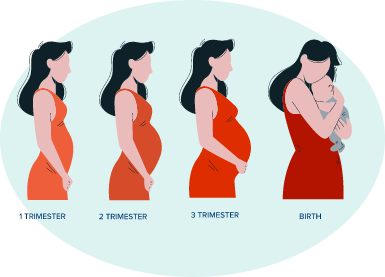





No lab centers are available in this city
The first trimester, spanning weeks 1 to 13 of pregnancy, is the most important time for foetal development. The baby’s organ systems and physical structure are being formed at this time. During pregnancy, the doctor may advise a range of screenings, tests, and imaging procedures. These tests are designed to detect conditions such as congenital disabilities, gestational diabetes, and preeclampsia. Getting recommended tests in the first trimester is vital, as many conditions uncovered can be treated during pregnancy.
In the first few weeks, the fertilised egg implants in the uterus and rapidly develops into an embryo. By week 5, a heartbeat can be detected. By week 8, limbs, fingers, toes, and facial features begin taking shape. By the end of the first trimester, all major organs have formed and begun functioning. The foetus is about 3 inches long by week 12.
Importance of First Trimester Screening
The first trimester screening is a critical part of prenatal care and evaluating the health of a pregnancy. This screening is typically conducted between weeks 11-13 of the pregnancy. It involves a combination of tests that assess the risk of certain birth defects or complications.
You can online book a blood lab test to ascertain pregnancy at a lab near you at the most competitive prices with Max Lab. Check the cost of the pregnancy test online, and what the sample collection will entail, and book an appointment with complete ease.
Detecting Potential Issues Early
The first trimester screening test allows doctors to estimate the risk for certain issues that may affect the pregnancy. It screens for:
Catching these types of issues early in pregnancy allows parents to better prepare emotionally, medically, and financially. It also allows time to run further tests like amniocentesis if needed. Early detection gives more options for managing the pregnancy.
The first trimester blood tests check levels of two proteins – Pregnancy-associated plasma protein-A (PAPP-A) and human chorionic gonadotropin (HCG). The ultrasound visually examines the embryo/foetus for any obvious abnormalities.
If defects are suspected, follow-up testing like chorionic villus sampling or amniocentesis can confirm the same. But first trimester screening provides an initial risk assessment very early on. While not definitive, first trimester screening provides vital insights into the health of a pregnancy from the earliest stages. Detecting potential problems early enables the best care and management going forward.
What Does the First Trimester Tests Include?
The first trimester screening consists of two components - a blood test and an ultrasound. These tests are typically done separately. The bloodwork is usually conducted during or right after a regular prenatal checkup. The ultrasound exam will likely take place at a different appointment with an ultrasound technician. Separating the blood draw and ultrasound allows each test to be performed at its optimal timing in the first trimester.
Some of the common first trimester prenatal tests include:
Blood tests - Blood tests during the first trimester of pregnancy check for anaemia, blood type, infections, and other conditions that could impact the health of the pregnancy.
Chorionic villus sampling (CVS) - This test examines cells from the placenta to check for genetic abnormalities. It is typically done when there is an increased risk for certain genetic disorders.
Nuchal translucency screening - An ultrasound is done to measure the clear space at the back of the foetus's neck. Abnormal results may indicate a higher risk of Down syndrome or other chromosomal abnormalities.
Cell-free DNA screening - Also called noninvasive prenatal testing (NIPT), this blood test analyses foetal DNA in the mother's blood to screen for Down syndrome, trisomy 18, trisomy 13 and sex chromosome disorders.
Ultrasound - An ultrasound uses sound waves to create images of the foetus, placenta, and uterus. It can date the pregnancy and screen for potential problems with development.
CBC (Complete Blood Count) - This is a routine blood test done early in pregnancy to check the woman's red blood cell, white blood cell, and platelet levels. It helps detect conditions like anaemia, infections, and clotting problems.
The first trimester is a critical time for prenatal testing and screening. These tests look for potential problems with the pregnancy or foetal development early on. Getting this vital information early in the pregnancy allows parents time to learn about any issues and make informed decisions about care.
Results + Next Steps
If one is pregnant, it is crucial for them to ensure they get all necessary prenatal check-ups done on time. Review the results of first trimester screening blood test carefully and discuss them with the doctor. Ensure to understand the results, what issues (if any) may be indicated, the accuracy of the test, and what the next steps will be.
Whether it is a test during the first trimester of pregnancy or a regular health checkup, it is extremely convenient to book diagnostic tests at Max Lab. One may also opt for an at-home sample collection. Test reports are generated in quick time and made available online at our website for download. Once the report has been generated, it is suggested that patients consult their doctor for a proper diagnosis and treatment plan.



Get ready for your baby's arrival
Sign up takes less than 60 secs and gives you access to your offers, orders and lab tests.
Looks like you are not registered with us. Please Sign up to proceed
OTP will be sent to this number by SMS
We have successfully received your details. One of the agents will call you back soon.
 To reach our help desk call 9213188888
To reach our help desk call 9213188888
No Lab Centers are available in this city
Looks like you are not registered with us. Please Sign up to proceed
OTP will be sent to this number by SMS
Not Registered Yet? Signup now.Looks like you are not registered with us. Please Sign up to proceed





 7982100200
7982100200.png)